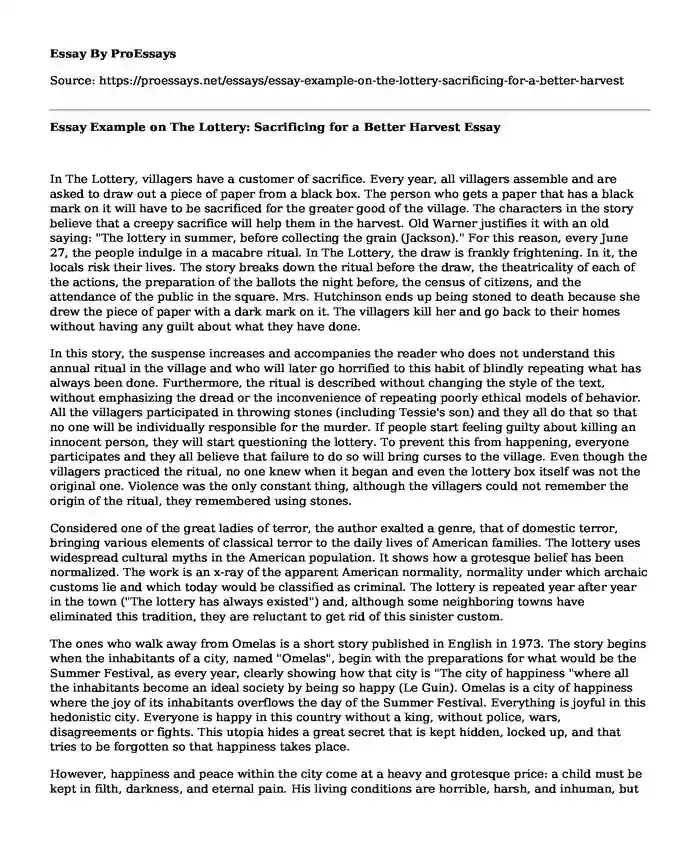In The Lottery, villagers have a customer of sacrifice. Every year, all villagers assemble and are asked to draw out a piece of paper from a black box. The person who gets a paper that has a black mark on it will have to be sacrificed for the greater good of the village. The characters in the story believe that a creepy sacrifice will help them in the harvest. Old Warner justifies it with an old saying: "The lottery in summer, before collecting the grain (Jackson)." For this reason, every June 27, the people indulge in a macabre ritual. In The Lottery, the draw is frankly frightening. In it, the locals risk their lives. The story breaks down the ritual before the draw, the theatricality of each of the actions, the preparation of the ballots the night before, the census of citizens, and the attendance of the public in the square. Mrs. Hutchinson ends up being stoned to death because she drew the piece of paper with a dark mark on it. The villagers kill her and go back to their homes without having any guilt about what they have done.
In this story, the suspense increases and accompanies the reader who does not understand this annual ritual in the village and who will later go horrified to this habit of blindly repeating what has always been done. Furthermore, the ritual is described without changing the style of the text, without emphasizing the dread or the inconvenience of repeating poorly ethical models of behavior. All the villagers participated in throwing stones (including Tessie's son) and they all do that so that no one will be individually responsible for the murder. If people start feeling guilty about killing an innocent person, they will start questioning the lottery. To prevent this from happening, everyone participates and they all believe that failure to do so will bring curses to the village. Even though the villagers practiced the ritual, no one knew when it began and even the lottery box itself was not the original one. Violence was the only constant thing, although the villagers could not remember the origin of the ritual, they remembered using stones.
Considered one of the great ladies of terror, the author exalted a genre, that of domestic terror, bringing various elements of classical terror to the daily lives of American families. The lottery uses widespread cultural myths in the American population. It shows how a grotesque belief has been normalized. The work is an x-ray of the apparent American normality, normality under which archaic customs lie and which today would be classified as criminal. The lottery is repeated year after year in the town ("The lottery has always existed") and, although some neighboring towns have eliminated this tradition, they are reluctant to get rid of this sinister custom.
The ones who walk away from Omelas is a short story published in English in 1973. The story begins when the inhabitants of a city, named "Omelas", begin with the preparations for what would be the Summer Festival, as every year, clearly showing how that city is "The city of happiness "where all the inhabitants become an ideal society by being so happy (Le Guin). Omelas is a city of happiness where the joy of its inhabitants overflows the day of the Summer Festival. Everything is joyful in this hedonistic city. Everyone is happy in this country without a king, without police, wars, disagreements or fights. This utopia hides a great secret that is kept hidden, locked up, and that tries to be forgotten so that happiness takes place.
However, happiness and peace within the city come at a heavy and grotesque price: a child must be kept in filth, darkness, and eternal pain. His living conditions are horrible, harsh, and inhuman, but the people most of the older people believe happiness depends entirely on the dreadful misery of this child. The unhappiness of a person, the suffering of this child must exist for the happiness of the greatest number. The elders believe it would be too stupid to denounce the happiness of thousands of people for the possibility of the happiness of one. They carry out the practice in an ordinary manner though it is a very grotesque action.
Conclusion
Citizens only learn about this truth once they are grown up. They become upset and shocked, however, many of them decide to ignore what is happening, believing that the happiness and joy of the town are independent of the individual injustice carried out on the child by the city. However, some people decide to leave the city after learning about the injustices being carried out. Where they go is unknown, and no one in the city realizes where those who leave end up. The story implies that very few stray from the darkness of the city, most likely because unlike most they cannot accept living in an ideal utopia when in reality its perfection derives from a horrible truth.
Works Cited
Jackson, Shirley. The lottery and other stories. Macmillan, 2005.
Le Guin, Ursula K. The ones who walk away from Omelas. Creative Education, 1993.
Cite this page
Essay Example on The Lottery: Sacrificing for a Better Harvest. (2023, Jul 24). Retrieved from https://proessays.net/essays/essay-example-on-the-lottery-sacrificing-for-a-better-harvest
If you are the original author of this essay and no longer wish to have it published on the ProEssays website, please click below to request its removal:
- Essay Example on A Rose for Emily: A Murder or a Suicide?
- Shakespeare's Twelfth Night Essay
- Paper Example on Odysseus, Aeneas, and Antigone
- Essay Sample on Gender in 'Taming of the Shrew'
- The Sovereignty of Divine Law Over Civil Law in Antigone: Critical Essay Sample
- Essay Sample on Brave New World: Consider the "Savages"
- Research Paper on The Great Flood: Understanding Ancient Myths of Destruction







